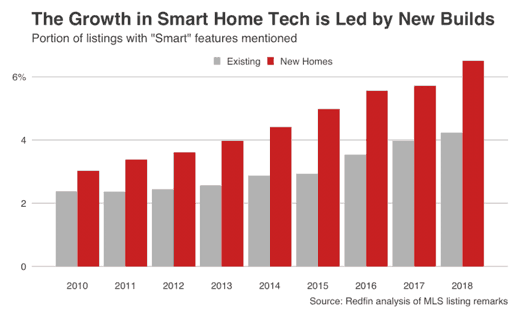As technology advances, our homes are getting smarter–but will it add value when it’s time to sell? Our experts weigh in with 6 key tips.
Smart technology, especially gadgets for the home, can be wacky and fun. Some are fun to play with, while others cut energy costs, help secure your home, or make our homes more intelligent overall.
But when when it comes to using them to increase the value of your home, tread carefully.
“The more connected your home is, and the more you know about it, the more you’re going to enjoy your home,” Boise-based Redfin agent Paul Reid said. “Additionally, a homeowner who invests a lot of time and money in smart features likely takes good care of their home, and a well cared-for home is worth more. But smart technology on its own likely won’t increase a home’s value. You can spend a lot on a Nest thermostat, but the investment is unlikely to translate into an increased perceived value in the eye of a future buyer.”
Redfin senior economist Taylor Marr echoed the concern. “Technology that promotes safety or saves a homeowner money holds more value than tech that just plays music or turns on lights. Don’t buy under the presumption that the next buyer wants all the same tech. It’s not a one size fits all model.”
However, technology is still exciting, innovative and worth investing in–just, pun intended, smartly. Here’s what you should know about what’s worth your time and money.
1. Read the fine print
“Technology can come with multi-year contracts. If you’re not planning to be there long, or you end up selling the next year, you’ll still be required to pay for the full term of the contract,” Reid warned. “I had clients who had to sell unexpectedly and now have to account for the couple thousand dollars they owe to the security company.”
2. Tech does have a home in new construction
“The biggest bang for your buck is in the new home market. Builders are investing in smart appliances, so be sure to ask for and take advantage of these upgrades,” said Marr. “In new construction listings, the prevalence of the word “smart” has more than doubled since 2010. In 2018, more than 6 percent of new home listings mentioned smart features, compared with 4 percent of homes for sale overall.”

3. Use smart tech to save energy
“Tech that helps your home use energy more efficiently is more likely to enhance your home’s value,” Reid said. “A fully interconnected solar panel system that generates power to backup batteries has a very real and direct impact. A smart toilet, on the other hand? That seems like a very personal decision, and you can’t have any expectation the next buyer is going to see that same value.”
4. Add your gadgets to any closing checklist
“Technology is deeply tied to your security, with personal information stored on your computer, phone and iPad. If you’re moving, be sure to notify the company associated with any installed alarm or security systems, and if you’re the buyer, add these items to your checklist to verify at closing,” Reid said.
5. It can help make neighborhoods safer
“People who use this equipment are connecting on neighborhood listservs, Facebook groups and other forums to share footage or intel about a suspicious person or lost package. As community members form bonds and neighborhoods become safer as a result, home values can benefit,” Reid said.
6. Look at the luxury market
“Smart tech investments go further in neighborhoods with higher home values where buyers more often prioritize and expect features like automated lighting, blinds, and customized finishes. However buyers who are focusing on affordability are less likely to seek or want to spend more on a home that has extravagant high-tech features,” said Reid.
Now that you know what’s worth it, read on for our guide on how to create the ultimate smart home ecosystem.
This post first appeared on Redfin.com. To see the original, click here.
